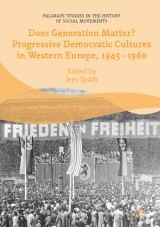Details

Does Generation Matter? Progressive Democratic Cultures in Western Europe, 1945-1960
Palgrave Studies in the History of Social Movements
|
106,99 € |
|
| Verlag: | Palgrave Macmillan |
| Format: | |
| Veröffentl.: | 21.05.2018 |
| ISBN/EAN: | 9783319774220 |
| Sprache: | englisch |
Dieses eBook enthält ein Wasserzeichen.
Beschreibungen
<p>“Generation” has become a central concept of cultural, historical and social studies. This book analyses how this concept is currently used and how it relates to memory and constructions of historical meaning from educational, historical, legal and political perspectives. Attempts to compare different national generations or to elaborate boundary-crossing, transnational generations still constitute an exception. In trying to fill this gap, this collection of essays concentrates on one crucial moment of “the age of extremes” and on one specific generation: the year 1945 and its progressive politicians and intellectuals. Focusing on Italy, West Germany and France, it suggests that the concept of generation should be regarded as an open question in space and time. Therefore, this volume asks what role generation played in the intellectual and political debates of 1945: if it facilitated change, if it served as source of solidarity and cohesion and how post-war societies organized theirtime.</p>
<p><b>Part I. </b><b>Does Generation Matter? Progressive Democratic Cultures in Western Europe, 1945-1960.- Chapter 1 </b>Introduction: Generation as an Open Question; <i>Jens Späth</i>.- Chapter 2 Towards a New Political Culture? Totalitarian Experience and Democratic Reconstruction after 1945; <i>Andreas Wirsching</i>.-<b>Part II. Intellectuals, Science and Democracy.- </b>Chapter 3 The Original 45ers. A European “Generation of Resistance”?; <i>Dominik Rigoll</i>.- Chapter 4 Continuity in rupture. The Italian and German constitutional culture after 1945; <i>Maurizio Cau</i>.- Chapter 5 Toward a New Political Science in Italy and West Germany After 1945: Democracy, Politics and Generational Change; <i>Gabriele D’Ottavio.- </i><b>Part III. Progressive Party Politics.- </b>Chapter 6 Lost Generation? Nicolò Carandini, the Decline of New Liberalism and the Myth of a New Europe; <i>Christian Blasberg</i>.- Chapter 7 Old and New Democracy. Placing the Italian Anomaly in a European Context; <i>Jan de Graaf</i>.- Chapter 8 Inheriting Horror: Historical Memory in French Socialists’ and German Social Democrats’ Fight for European Democracy, 1945–1958; <i>Brian Shaev.- </i>Chapter 9 Two 'Difficult Outsiders'? Antifascism, Antinazism and Democracy in Lelio Basso and Wilhelm Hoegner; <i>Jens Späth.- </i>Chapter 10 European Socialism and the French-German Reconciliation; <i>Christine Vodovar</i>.- Chapter 11 Conclusions: Five Dimensions of Generation around 1945; <i>Jens Späth.</i></p>
<p><b>Jens Späth </b>is Lecturer of Contemporary European History at Saarland University, Germany. </p>
“Generation” has become a central concept of cultural, historical and social studies. This book analyses how this concept is currently used and how it relates to memory and constructions of historical meaning from educational, historical, legal and political perspectives. Attempts to compare different national generations or to elaborate boundary-crossing, transnational generations still constitute an exception. In trying to fill this gap, this collection of essays concentrates on one crucial moment of “the age of extremes” and on one specific generation: the year 1945 and its progressive politicians and intellectuals. Focusing on Italy, West Germany and France, it suggests that the concept of generation should be regarded as an open question in space and time. Therefore, this volume asks what role generation played in the intellectual and political debates of 1945: if it facilitated change, if it served as source of solidarity and cohesion and how post-war societies organized their time.<p></p>
Examines the role of generation in the intellectual and political debate of 1945 across Germany, France and Italy Offers a comparative approach to the evolution of these national political cultures, offering a micro-regional analysis of the concept of a pan-European generation Considers the changes and continuities in political structures marked by 1945 and questions the role of historical memory in these new democratic societies

















